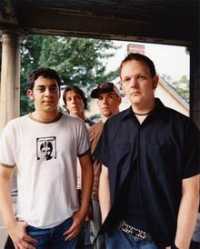Artie Kitchen - vocalist James Federico - bass, piano Sal Guanti – drummer Steve Pepe - guitarist
Seymour Glass represents what's great about rock 'n' roll, namely the idea that a promising band from Staten Island can offer a whole new world of musical possibilities. The group's debut album, Note to Self, delivers the melodies to rock the radio dial and the poetic words to stir the soul, but it's the band's innovative marriage of grit and grace that smashes open the doors of inspiration.
With a new vision of rock's future, Seymour Glass lives up to its indie rock cred by creatively blending post-hardcore urgency, haunting vocals, and the elegance of textured piano play. This inspired marriage of guitars and pianos seems radical, not unlike a blue-collar raid on white-collar culture, yet the band's balanced approach brings these worlds together with seamless accord. This new sound, which developed naturally over several years, boasts an authenticity that only comes from such an organic rise. The result, a revolutionary debut that gives the beautiful sound of keys a solid indie rock thrashing.
"We show how a piano can go from a calm place to apocalyptic end-of-the-world heaviness without losing a sense of how we got there," says pianist-bassist James Federico. "Our songs are like the evolution from an argument to a World War."
Epitomizing this sweeping sound, "Trigger Finger" features vocalist Artie Kitchen firing out distorted and undistorted vocal flows over a prominent piano line. As it builds toward a full-band blast, the song - an allegorical look into an abandoned soldier’s inner-conflict - interchanges energy and texture levels for a fast-moving dynamic. The title track "Note to Self" also uses shifting styles, effortlessly moving between drum loops and live drums, as it heads toward Kitchen's frustrated confession in the song's catchy chorus. "Rocket Science," a literal outer space narrative that parallels real life emotions, employs a string arrangement as it edges toward prominent guitar hooks, solid drum rolls, and a vocal-heavy chorus. This song also illustrates the band's DYI ethic, as do the handful of other tracks that include string sections, for all such string arrangement and orchestral scores were written and conducted by band members Federico and guitarist Steve Pepe.
As a whole, Note to Self shapes an emotional arc that begins with the drum-driven aggression of "Hypervent" and closes with the lush serenity of "Everytime," while the 11 songs in-between offer their own mix of beauty and brawn. For example, "A Drive By" pushes hard on the keys and chords, yet it isn't afraid to add finer piano accents during the stop-and-start moments, while "Car Crash" focuses on vocal intensity with a solid rhythmic backing by Federico and drummer Sal Guanti. Likewise, the buzzworthy "Chemicals" puts forth intimate piano-packed verses that play off the heavier band moments, while "CPR" employs an eerie mellowness that provides atmosphere for Kitchen's tortured tale of neighborhood politics. "Abrasion Uncommon," with its slick tempo twists, belts out unexpected changes ranging from ethereal background vocals and bitter lyrics to crashing guitars and a near piano solo. Summing up the album's duality, "Thorazine" lightens the tone with acoustic guitars and earthy vocals, yet the music is betrayed by earnest lyrics about love's endless disappointments. Such dark themes are prevalent on Note to Self as they reflect the singer's notion that expecting the worse leaves no place to go but up.
"I'm definitely not a glass half full kind of person," admits Kitchen, who finds his meds at the microphone. "I go into the studio with the worst attitude in the world and come out feeling like I was shelled into someone else's body. Writing music is like a one-sided conversation with people looking in. For once in your life, you get to say what you want to say, and no one can tell you you're wrong."
Prior to Seymour Glass, members Kitchen, Pepe, and Guanti performed in a hardcore band, while Federico played drums in an emo group. Meeting through friends in the Staten Island hardcore scene, the foursome came together in the late nineties with Federico switching to bass and eventually adding piano. After exploring various influences and ideas, the group set itself upon its current path around 2000. Sharing a love for J.D. Salinger, the group took on the name Seymour Glass, an allusion to a popular Salinger character who returns from war a tragic figure. This literary influence pops up in several of the album tracks and in the artwork.
Seymour Glass, whose dramatic live performance and visual effects are legendary in NYC, actually became the first signing to 456 Entertainment. For their debut, the group spent nearly 10 months working with noted producer Howie Beno (Ministry, Blondie) and traveled to different studios to use specific pianos for a wider range of sounds. With dedicated focus, the band diligently worked to fashion their signature style and tap into a deep emotional vibe.
Describing the influences brought to bear on the album, Guanti notes, "James loves to put on Beethoven, but he grew up on heavy hardcore, while Steve is a NYU graduate with a classical guitar background. Everyone adds their own little thing, and when something gives us the chills, we stick with it."
Another influence, though equally important, might be less obvious. Pepe explains, "We grew up together as good friends, and that's an important part of our band beyond anything else. We really tried to communicate our friendship in the music, and if we pulled it off, I think we really accomplished something."
Seymour Glass' 13-song entry into the indie rock world demonstrates the artistic opportunities still available to those bold enough to seek them. Immediately accessible yet infinitely deep, Note to Self is a tastemaker's classic with potential as limitless as its creative vision.
